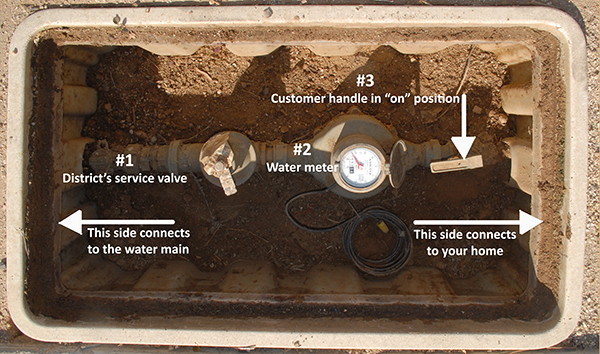When an earthquake or other disaster strikes. . . Be Prepared!
Water is essential to you and your family in times of a disaster.
The Center for Disease Control (CDC) recommends 14 gallons per per person. That equals a two week supply of water for each person. Also, take into account extra water for pets and livestock. Below are resources to learn how to best prepare your emergency water supplies.
View the CDC instructions for creating and storing an emergency water supply
View the Ready.gov webpage on emergency water supplies
Smart Californians know that a quake can happen anytime. In addition to your water supplies, make sure to have these items ready and accessible...
- Portable radio and extra batteries
-
Flashlights and extra batteries
- Shoes - available under bed and in car
-
First aid kit
- Water for each family member: One gallon per person per day with enough for at least three days
- Food and water for pets. Non-perishable food items, such as canned food, granola bars, MREs, etc.
- Manual can opener
- Required medications and eyeglasses
- Other means of cooking, such as camp stove
- Blankets, warm clothes, shoes, gloves,
protective goggles, hard hat
- Useful tools – sledge hammer, crow bar, saw, duct tape, rope, adjustable wrench
- A car charger for your cell phone
Useful Information…
- The safest places in your home are away from heavy objects, appliances, windows, pictures, mirrors. During a quake, stay away from the kitchen!
- Know the locations of gas, water and electrical shut-offs and know how to use them.
- Set a location where family members will reunite. Remember, you may have to remain at work or school for a few days.
- Have a central person of contact, preferably one who resides outside California.
- Know the locations of the nearest police, fire stations and medical centers.
Following a Quake...
- Put on shoes before moving around to prevent cuts from broken glass and debris.
- Check others for injuries.
- Inspect for fire or fire hazards.
- Check for:

- Water heater
- Water leaks (shut off at meter or at main house valve if any doubt).
- Gas leaks (shut off main if in doubt).
- Electrical damage (shut off service if in doubt).
- Be extremely careful in and around kitchen, where broken glass, heavy appliances and spilled cleaning supplies can pose extra hazards. Use work gloves to protect your hands.
- If you have a house phone, make sure the handset is in its cradle.
- Locate your food and water supplies.
- Be sure your pets are secure.
- Listen to the radio for emergency instructions and information.
DO NOT…
- Eat or drink anything from open containers.
- Use lighters or candles for lighting – gas leaks or aftershocks could cause a fire.
|
|
